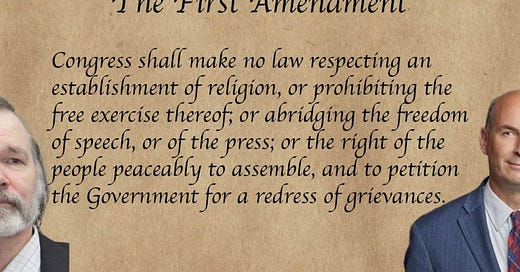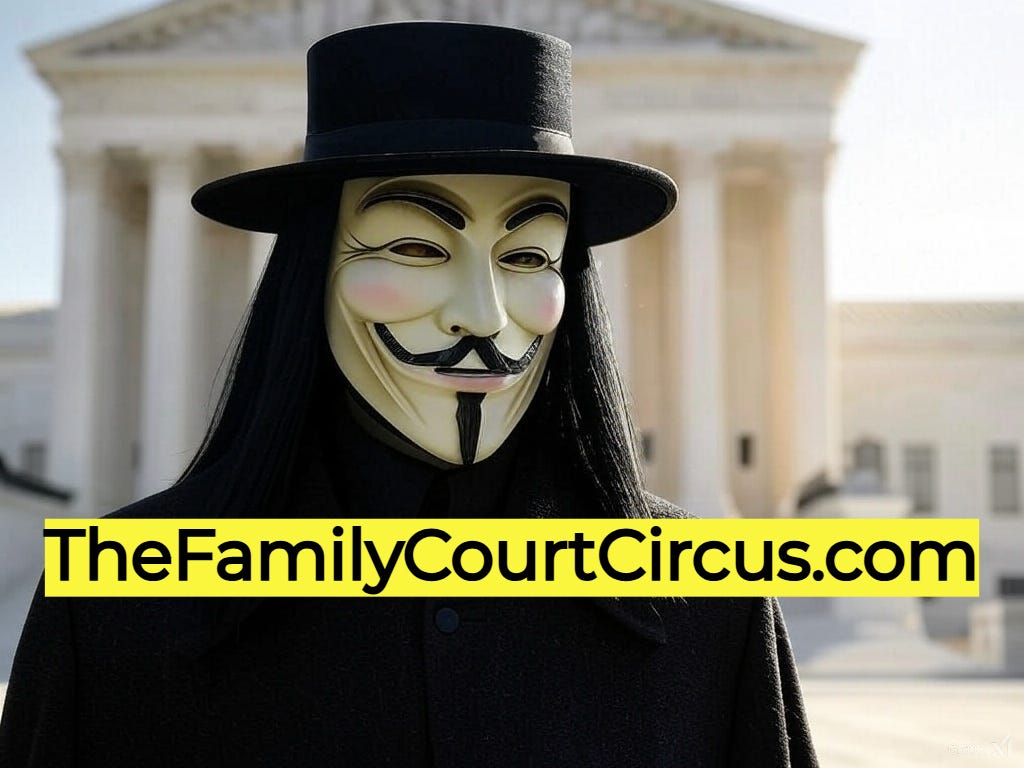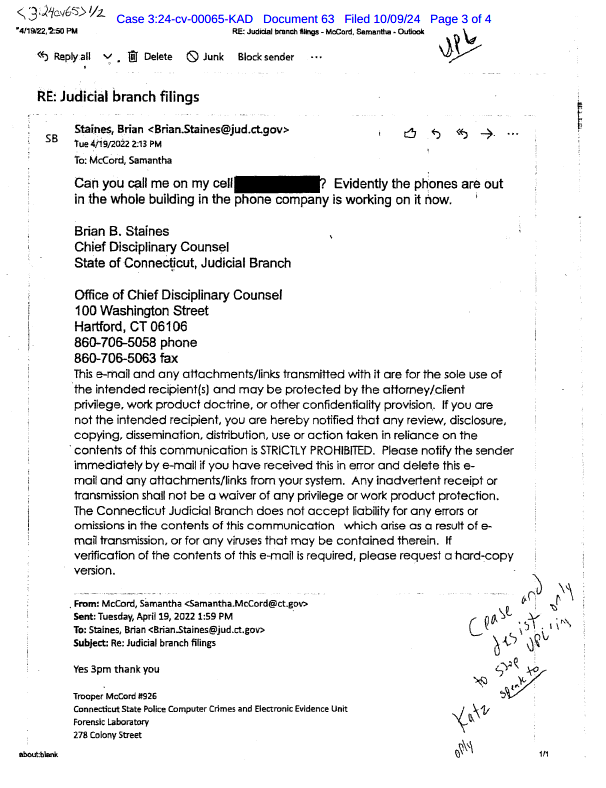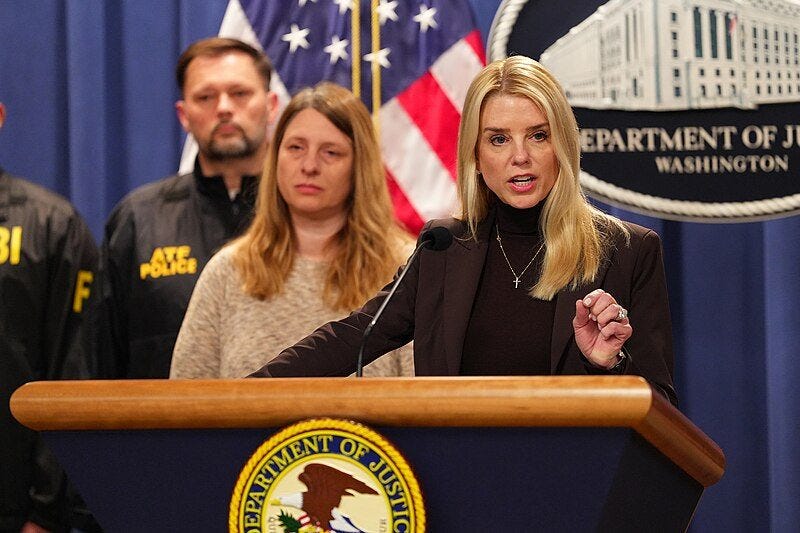Paul Boyne Strikes Back: No Free Speech and Weaponized Justice in Connecticut!
Cyberstalking or Judicial Retaliation? Blogger Demands Answers, Files Lawsuit Against Gov. Ned Lamont – Paul Boyne Strikes Back

NOTE: This piece was first published on TheFamilyCourtCircus.com.
By Richard Luthmann
Virginia family court blogger Paul Boyne is out of jail, but his legal battle is just beginning. After spending 18 months behind bars for controversial blog posts critical of Connecticut’s political, judiciary, and law enforcement establishment published on the now World-Famous Media Outlet TheFamilyCourtCircus.com, Boyne is back in Virginia under electronic monitoring.
Now, he’s using every legal tool at his disposal to challenge the case against him—and Connecticut’s entire system. It’s time for the next chapter in the Nutmeg State Epic: Paul Boyne Strikes Back.
Boyne says his actions are not crimes and are covered as free speech. He says he can show that the prosecution is bogus. Still, New Haven State Attorney Jack Doyle hasn’t given him the required information or notice to defend against or even ascertain the charges being levied.
Boyne has filed multiple motions, including a Bill of Particulars under Connecticut Practice Book §§ 41-20 and 21, arguing that the prosecution has failed to provide an adequate notice and description of the facts constituting charges against him. He says the state’s case is jurisdictionally defective, as none of the alleged threats were made in New Haven.
Boyne has also filed a lawsuit against Connecticut Gov. Ned Lamont, challenging his extradition from Virginia and the constitutionality of the state’s stalking law. His suit argues that Connecticut’s 2021 amendment to its stalking statutes violates the First and Fourteenth Amendments.
Adding fuel to the fire, a recent New Hampshire Supreme Court ruling in Attorney General v. Hood struck down an overbroad application of a hate crime statute, a decision Boyne believes strengthens his free speech defense.
Paul Boyne Strikes Back: Demand for a Bill of Particulars – Show Me The Case!
Boyne’s request for a Bill of Particulars is a direct challenge to the legitimacy of the prosecution.
Under Connecticut Practice Book §§ 41-20 and 21, criminal defendants have the right to demand clear details on the charges against them, including where, when, and how the crime allegedly occurred.
Sec. 41-20. Bill of Particulars; Time for Filing
Pursuant to Section 41-5, the defendant may make a motion, or the judicial authority may order at any time, that the prosecuting authority file a bill of particulars.
(P.B. 1978-1997, Sec. 831.)Sec. 41-21. —Content of Bill
The judicial authority shall order that a bill of particulars disclose information sufficient to enable the defendant to prepare the defense, including but not being limited to reasonable notice of the crime charged and the date, time, and place of its commission.
(P.B. 1978-1997, Sec. 832.)
Boyne’s argument is simple: the state has failed to provide reasonable notice of the charges. He maintains that New Haven lacks jurisdiction because:
None of the alleged threats occurred there.
The complaining witnesses—Judges Jane Grossman, Elizabeth Stewart, and Thomas Moukawsher—are not based in New Haven.
Connecticut law does not allow venue shopping for prosecutions.
“If the state can’t tell me where the crime happened, how can I defend myself?” Boyne has previously argued.
Recently, his comments were directed towards State Attorney Jack Doyle, who Boyne believes is knowingly maintaining the bogus criminal charges.
“Jack will not specify the criminal political felony prose under the facially unconstitutional ‘stalking’ statute. The game is obvious,” Boyne said.
Legal analysts say that if Judge Brown denies the Bill of Particulars, any Boyne conviction could be dead on appeal before the trial even starts.
Hood Case Win in New Hampshire: A Game-Changer for Free Speech?
Boyne has seized on a recent free speech victory in New Hampshire, where the Supreme Court dismissed charges against Christopher Hood and NSC-131, a neo-Nazi group.
The case centered on a “KEEP NEW ENGLAND WHITE” banner hung from an overpass.
The New Hampshire Attorney General argued that Hood and his group committed a racially motivated trespass and violated the state’s Civil Rights Act.
However, the state Supreme Court ruled the law unconstitutional, citing overbreadth and free speech violations.
Boyne believes the ruling is directly relevant to his case.
“If the First Amendment protects neo-Nazis hanging racist banners, it certainly protects me from prosecution over protected satire and the expression of a well-founded belief that an elite pedophile ring runs the Nutmeg State,” he said. “It’s no coincidence that no one in charge over there celebrates Easter.”
Boyne’s anti-Semitic rhetoric makes him an unsympathetic figure. However, some legal experts concede the Hood case could bolster Boyne’s defense, as it affirms that government overreach in punishing speech violates the Constitution.
Renowned UCLA Law Professor Emeritus Eugene Volokh wrote amicus briefs in Releford v. Illinois and Mashaud v. Boone, defending the First Amendment even against perceived heinous speech and people.
In Mashaud, the D.C. Circuit re-emphasized this point: “The First Amendment restricts the government’s ability to prohibit and punish speech. Its protections extend to speech that is offensive, outrageous, and emotionally distressing.”
Boyne believes his case and alleged conduct qualify as protected speech, and Hood confirms this for him.
On the Hood case, Volokh says, “The right result, I think, but I don’t think the court’s reasoning is quite right.“
When will Volokh opine about the legal reasoning in Boyne’s case?
Paul Boyne Strikes Back: Sues Gov. Ned Lamont Over Extradition and Stalking Law
Boyne has also taken the offensive, filing a lawsuit against Connecticut Gov. Ned Lamont, claiming his extradition from Virginia was unlawful.
The lawsuit challenges the constitutionality of Connecticut’s stalking statute, arguing that its 2021 amendment (Public Act 21-56) is a blatant First Amendment violation.
The law expanded Connecticut’s cyberstalking provisions, allowing prosecutors to charge individuals for “reckless” online speech that could cause fear, even without intent to threaten.
Boyne’s suit argues that this overbroad and vague law criminalizes dissent, allowing Connecticut courts to weaponize speech-based prosecutions against critics of the judiciary.
“Connecticut changed the law to go after people like me,” Boyne said. “They’re criminalizing criticism.”
First Amendment scholars have raised concerns about the law, arguing that it conflicts with Supreme Court precedent, including the 2023 Counterman v. Colorado ruling, which held that true threats require proof of intent.
Paul Boyne Strikes Back: Depositions to Expose the Judiciary?
While Boyne is taking the fight to state and federal courts, critics say he should focus on shutting down the case procedurally.
Under Connecticut General Statutes § 54-86, Boyne has the right to depose key figures in his case, including:
Judges Grossman, Stewart, and Moukawsher—the alleged victims of his supposed cyberstalking threats.
Detective Samantha McCord’s “KATZ SPEAK TO ONLY” email suggests improper judicial involvement in Boyne’s prosecution.
Former Connecticut Supreme Court Justice Joette Katz, Boyne believes, is the hidden hand behind the case.
Boyne could argue that the case must be dismissed on due process grounds if these figures refuse to sit for depositions.
“This is the nuclear option,” one legal expert said. “If Boyne’s attorneys force these depositions, the case likely collapses.”
Will the Trump DOJ Intervene?
Boyne’s case has drawn attention from conservatives and free speech advocates, many of whom believe Connecticut’s judiciary is out of control.
Some believe the Trump Department of Justice should investigate the case as a weaponization of justice, arguing that Connecticut’s judiciary is using Lawfare to punish dissent.
“This isn’t about protecting judges—it’s about silencing critics,” a connected federal source noted. “No blue state justice systems are safe from scrutiny, whether it’s DOGE and funding or Justice and investigations.”
While Boyne’s anti-Semitic rhetoric makes him an unsympathetic figure, critics argue Connecticut’s prosecution of him is a bigger threat to democracy.
“Free speech is a point of emphasis for the DOJ, particularly where prosecutorial decisions, methods, and targets align with Lawfare and weaponization of justice. The questions about alleged blue state pedophile rings are also something there are plans to address,” the federal source said.
What’s Next for Paul Boyne?
Boyne’s next court date will determine whether the Bill of Particulars is granted. If denied, expect an appeal—and possibly a Supreme Court battle.
His lawsuit against Gov. Lamont could put Connecticut’s stalking law under federal scrutiny, especially if Trump’s DOJ takes an interest.
And if his legal team finally forces depositions, Connecticut’s judiciary may have a reckoning on its hands.
One thing is clear: Paul Boyne isn’t done fighting.
















Musk is saying that the child welfare systems is a Ponzi scam. The bar association is up in arms with musk. The welfare reform and responsible fatherhood act was first implemented in the state of Connecticut. Grants for projects are given through the department of children and family services. A lot of the fatherhood initiative projects are running through the health and human services. The entire system is lead by the state of Connecticut. It related to the criminal justice system. The Tanf block grant funding. The biggest piece of the pie is for other experiences in Connecticut. . This is the welfare of poor children. In 2011 equimundo presented a report to the United Nations. Rebranding masculinity. It's about domestic violence and rehabilitation. The report is on social welfare and economics. The fatherhood initiative experimental psychology programs coined material gatekeepers. This is attached to criminal matters. Dei projects Trump is looking at. On the surface it is labeled minority but it wealthy white men benefiting. Despite your advocacy for parental alienation people in the industry are trying to discredit you and anyone else spot light. The politicians in Connecticut especially are going bananas over Doge and Trump. The entire family court system is built on the welfare reform and responsible fatherhood determining best interest. As well as child support.These so called alienation experts have been allowed to exclusively almost run the racket in family law courts. Especially in the state of Connecticut. Many of us welcome Doge and Pam Bondi to the state of Connecticut. Parents have been complaining for decades and ignored. It would be fantastic is something was done about it.
Free Speech Under Siege: Connecticut’s Judiciary and the Erosion of Constitutional Rights
The case of Paul Boyne is a disturbing reminder of the reckless disregard Connecticut’s judiciary has for the Constitution. It is a textbook example of how the courts, which are supposed to uphold the rule of law, instead treat it as a set of suggestions to be ignored when inconvenient. Boyne’s case highlights the blatant weaponization of the judicial system against critics and the growing trend of using criminal statutes to suppress free speech.
First Amendment Violations: The State’s Overreach
Boyne's prosecution is nothing short of a direct assault on the First Amendment. The government cannot criminalize speech simply because it is critical of public officials, even if it is harsh, offensive, or controversial. The U.S. Supreme Court has long held that political speech enjoys the highest level of protection, and satire—even if biting—falls within its scope.
Yet, Connecticut’s judiciary has seemingly abandoned constitutional principles in favor of political expediency. By prosecuting Boyne under an overbroad and vague cyberstalking statute, the state is attempting to criminalize dissent. This is precisely the type of governmental abuse the First Amendment was designed to prevent.
The 2023 Supreme Court ruling in Counterman v. Colorado reinforced that for speech to be criminalized as a "true threat," there must be proof of intent to threaten. Connecticut’s law, particularly after its 2021 amendments, allows prosecution for speech based merely on the subjective perception of the listener. That standard is not just unconstitutional—it’s a roadmap for judicial tyranny.
The Judiciary’s Brazen Lawlessness
Beyond the First Amendment violations, Boyne’s case also exposes how Connecticut judges manipulate the legal system for their own protection. The fact that the prosecution has refused to provide a clear explanation of the charges through a Bill of Particulars is telling. If the state cannot even specify where, when, and how a crime allegedly occurred, how can a fair trial be conducted?
The judiciary's venue-shopping further underscores its lawlessness. If none of the alleged threats occurred in New Haven and the judges involved are not based there, why is the case being prosecuted in that jurisdiction? Connecticut’s own laws prohibit such manipulations, yet its courts proceed as if legal protections exist only for those they favor.
Weaponized Justice and Political Retaliation
Boyne’s prosecution reeks of political retaliation. His criticism of the judiciary may be harsh, but public officials—including judges—are not above scrutiny. Instead of responding to his allegations with transparency, Connecticut’s legal establishment has resorted to imprisonment and legal harassment.
This is not about protecting judges from threats—it’s about silencing an inconvenient voice. The use of criminal charges to suppress speech is a hallmark of authoritarian regimes, not constitutional democracies. Connecticut’s judiciary is engaging in the very type of conduct that should prompt federal intervention.
Personal Experience: Judicial Retaliation Through Civil Restraining Orders
Connecticut’s courts have not limited their abuses to criminal cases. I personally have been subjected to similar retaliation at the hands of Judge Gerald Adelman. In a blatant attack on my free speech rights, Judge Adelman issued a civil restraining order against me solely because of my social media posts and my comments on articles criticizing him on The Frank Report.
This order was not based on any actual threats or misconduct—only on my exercise of free speech. It is another example of how Connecticut’s judges use the courts as personal shields against criticism. When public officials can silence their critics through restraining orders and criminal prosecutions, democracy itself is in danger.
The Bigger Threat: A Judiciary Untethered from the Law
Regardless of one’s views on Boyne’s rhetoric, the larger issue at stake is whether the government can wield its power to silence critics. If Connecticut’s courts succeed in this prosecution, the precedent set will be dangerous for all Americans.
Freedom of speech is not just about protecting agreeable or polite discourse—it is about protecting the right to speak truth to power, even in ways that may be uncomfortable for those in authority. Connecticut’s reckless judges have shown they do not care about the Constitution. It is time for higher courts, and potentially federal authorities, to step in and restore the rule of law.
#FreeSpeech #FirstAmendment #JudicialCorruption #WeaponizedJustice #ConnecticutCourts #LegalAbuse #JudicialMisconduct #CourtCorruption #PaulBoyneCase #Censorship